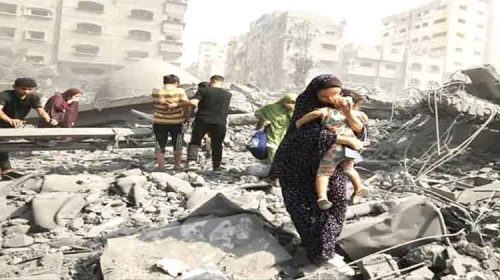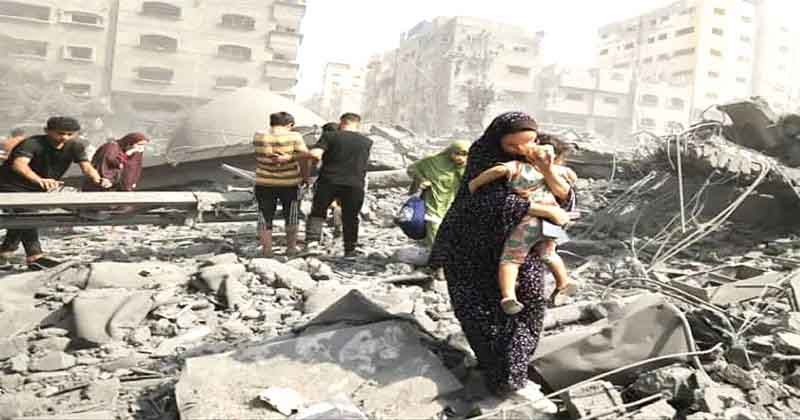The role of global leadership is an important topic of discussion in international sociology. Since 1945, after World War II, America has established itself as global leader and has played an active role in international politics to maintain it. They are the most busy among the Muslim states. Besides, other religious states are not spared from their persecution. Basically, the United States is showing power in the name of world leadership, suppressing its own interests and superpowers, and killing small and weak states to protect the interests of friendly countries. At the same time, it is working to spread global power and dominance to defeat the enemy side. Which is hostile to world peace. Analysts believe that if these are not stopped, there is a possibility of World War III again. At present, the context of Bangladesh shows whether Bangladesh is also going to step into the trap of America. The analysis can be done by looking at some examples of America’s manipulation. Due to some anti-American words of the previous government of Sheikh Hasina, many restrictions were imposed on Bangladesh. Which has proved to be not auspicious for the country. Many people think that they are involved in war with crocodiles by living in water. The effects of which have already begun to wear off. Which has been seen in various newspapers. Some manifestations of America’s pride are evident in the discussion below.
Power and Hegemony: From the perspective of international sociology, America exerts global influence through its economic, military and cultural power. This is explained in terms of “hegemony”, where America imposes its values, political ideals and economic policies on other countries.
Neoliberalism and Globalization: America has expanded its influence through globalization. In the 1980s, the concept of “neoliberalism” influenced the economic policies of other countries through market liberalization, privatization, and economic reforms. The US also exerts influence through these policies through international institutions such as the IMF and the World Bank.
Military deployment: In terms of security and military power, America spends a huge amount of budget and establishes military bases in various countries. Many experts believe that this US military presence constitutes a kind of “turning point”.
Criticism and International Reaction: Many states and experts criticize this expansion of American influence. Some countries, including China and Russia, are challenging this American hegemony and moving toward a “multipolar” world order.
The impact and damage to Muslim states of American intervention is particularly significant. US intervention in Muslim-majority countries in the Middle East, South Asia and Africa has directly and indirectly led to their political instability, economic collapse and social breakdown. Below is a discussion of some of the countries that have suffered the most from US intervention:
Iraq Damage and Impact: The US intervention in Iraq had a particularly devastating impact. In 2003, Saddam Hussein’s government was overthrown by invading Iraq on false accusations of weapons of mass destruction. A political vacuum was then created in the country and various sectarian groups and terrorist groups emerged. The rise of radical organizations such as IS or the Islamic State occurred at this time, causing great instability in Iraq and surrounding countries. The war and subsequent violence disrupted the livelihoods and economy of the people of Iraq. The US intervention in Iraq (especially after the 2003 Iraq War) has caused massive damage to the country, with profound impacts in the humanitarian, economic and social spheres. Until recent years, various studies, organizations and experts have highlighted the following main aspects of this damage:
Humanitarian Casualties – Following the US intervention, the general population of Iraq faced a dire humanitarian crisis. Hundreds of thousands of civilians died in fighting and violence. Many people have been injured and displaced, and many children have lost their parents due to this war. According to the project, more than 200,000 civilians have lost their lives as a result of the Iraq war, and many people are still injured and suffering from physical problems. In addition to the economic damage, social, political and cultural impact of the war, Iraq’s social infrastructure has been destroyed. The provision of education, health care and other basic services has become more fragile due to mismanagement and corruption. Religious and ethnic conflicts have increased, leading to long-term divisions within the country.
Casualties and Impacts in Afghanistan: Afghanistan has witnessed the longest US military operation, lasting nearly two decades. The United States became involved in Afghanistan in 1979 by supporting the anti-Soviet Mujahideen. Later, in 2001, the US re-entered the country to oust the Taliban. This prolonged war destroyed Afghanistan’s economy and infrastructure and caused immense suffering to the Afghan people.
Heavy damage and impact of the war in Libya: In 2011, the United States, with the help of NATO, overthrew the government of Muammar Gaddafi by carrying out a military operation in Libya. After the fall of Gaddafi, Libya became a de facto failed state, with clashes and conflicts between various armed groups and militias. The political vacuum and social chaos caused by the US intervention in Libya continue to destabilize the country.
Damages and impact in Syria: The US was indirectly involved in the civil war that started in Syria in 2011 by supporting various rebel groups. The civil war in Syria has had a severe impact on the country’s infrastructure and population. The US intervention in Syria has led to the emergence of various extremist groups, which have destroyed the country’s integrity and stability. Millions of people have lost their lives due to this war in Syria and many people are living as refugees.
Damage and influence in Iran: In Iran, a CIA-led coup in 1953 overthrew the first democratically elected prime minister, Mohammad Mossadegh, and installed the pro-American Shah Mohammad Reza Pahlavi. After the Islamic Revolution in Iran, the United States imposed a series of economic sanctions on Iran, which had a profound impact on the country’s economy. The sanctions have hampered Iran’s oil exports and foreign exchange flows, causing hardship to the country’s people.
In recent years, American concerns about Iran’s military and nuclear development have grown. That is why the US sometimes imposes additional sanctions and military threats on Iran. As a result of this, Iran’s military power and economic base have been greatly damaged.
Impact of losses in Yemen: A Saudi-led coalition with US military support is formed to fight Houthi rebels in Yemen. Saudi Arabia has been carrying out a series of attacks on Yemen using US weapons and intelligence support. As a result, the humanitarian crisis in Yemen has become extreme. The war has left millions of Yemenis suffering from food shortages, insecurity and health problems.
Damage and impact in Palestine: Indirect US intervention in Palestine has long existed, particularly in the Israeli-Palestinian crisis, with the US siding with Israel. This support increased Israel’s military power and complicated the process for the Palestinians to establish their independent state. The US has a direct influence on the ongoing conflict, settlements and other issues in Gaza and the West Bank, which have caused great suffering for the Palestinian people. The ongoing conflict between Israel and Palestine has taken a heavy toll on the residents of Gaza. As of October 2024, Israeli attacks have killed more than 40,000 Palestinians, many of them women and children. The number of injured exceeded several thousand and many houses and infrastructure were destroyed. Gazans are in dire humanitarian crisis due to lack of electricity and water. The detailed situation of this conflict and the humanitarian disaster in the news have revealed the picture of difficult humanitarian challenges. Which exists as a long-term problem not only for these countries but for the entire world.
America has at various times intervened militarily and politically in many other countries besides Muslim states. Some notable examples are: Vietnam – Between 1955 and 1975, America intervened in the Vietnam Civil War, known as the “Vietnam War”. Cuba – The US intervened against Cuba in 1961 with the “Bay of Pigs” operation. Chile – In 1973, the US intervened indirectly during a military coup against the democratically elected president of Chile, Salvador Allende. Nicaragua – In the 1980s the US supported the “Contras” rebels who sought to overthrow the then Nicaraguan government. Panama – In 1989, the US launched a military operation in Panama and overthrew the Noriega government. Haiti – The US intervened at various times during Haiti’s political crisis, most notably in 1994 and 2004.
In addition to these, America has intervened in various ways in the political and military fields of various countries in Latin America, Africa and Asia. The reason for this intervention is usually to preserve America’s geopolitical interests and to prevent communism. Therefore, it can be said that the Muslim majority countries have been greatly affected by the political and military intervention of the United States. Wars, military aggression, economic sanctions and political unrest have created massive financial and social crises in these countries. This type of US intervention in Muslim countries has at times led to extremism, terrorism and security risks. Analysts are not ruling out such a possibility in Bangladesh recently.













